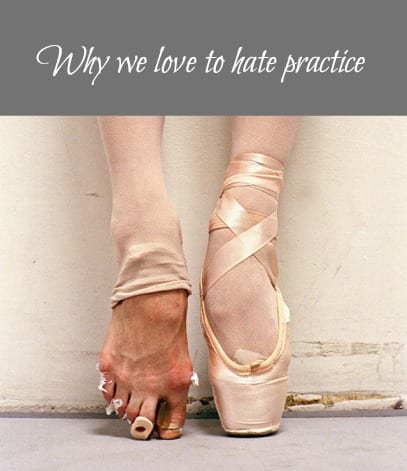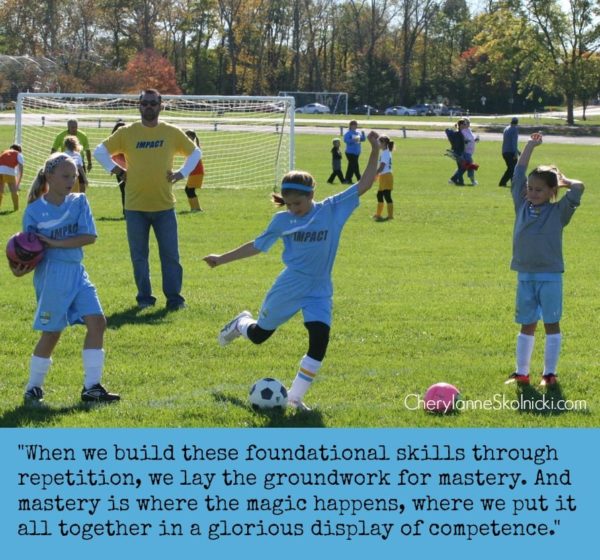This morning, my daughter was barely out of bed before she started lamenting the fact that she has to go to practice tonight. “Mom. Seriously. I need a way to get excited about this.” Then, jubilant, “I’ve got it! I can be excited that I have that new outfit to wear to practice. ” I didn’t know whether to laugh or to cry!

What is it about practice that makes the most enthusiastic young athlete or musician crumple up in a ball and disintegrate into a pile of grumpiness? The same child who can’t wait to suit up for game day or to show up for the big performance resorts to whining and complaining before all the sessions leading up to those moments of glory. The soccer drills, piano scales, basketball free throws, and voice lesson lip trills just don’t hold a candle to the real thing. But why, exactly?
Exasperated, I broached this subject with my normally exuberant and positively positive ten-year-old, and learned that from her perspective, “When we’re just running drills, it feels like so much work. But when we scrimmage or something, it’s more like a game and then it’s fun.”
My seven-year-old, who has been in and out of three sports so far, sees it differently. He just doesn’t like being told what to do – he’s happy as a clam when he’s “training” on his own equipment in the backyard, but the structure of a practice feels confining to him after a long day of following the rules at school (my words, not his). As evidence, check out this video of him training on his very own salmon ladder like you see on the hit show American Ninja Warrior. He would do this ALL DAY LONG given the chance, and he has the blisters to prove it.
It seems to me that adults don’t much like to practice, either. We’d rather just snap our fingers and arrive at competence. As a result, we often don’t even begin to practice things we’d truly enjoy doing once we got good at them. Cooking is a great example of this. People tell me “I can’t cook” when they have never taken steps to learn. They spend their life resenting the dinner hour and envying their friends who can cook, when some time practicing is all they really need! (And don’t even get me started on sewing. We’ve already discussed my lack of skill in that arena here! But ask me if I’ve ever practiced. On second thought, don’t!)
So let’s look at why we disdain practice so much.
1) As a culture, we celebrate mastery, not effort.
Think about it. When we see our heroes (the NBA pros, the violin virtuosos, the Olympic athletes, the Broadway stars, the wildly successful entrepreneurs), we see examples of incredible excellence, but not of what it took to attain that excellence. When we compare our own bumbling efforts to their accomplishments, we come up short, without realizing that even these masters once struggled. I’d love to see more publicity of the everyday hard work these high achievers have put into their craft. It would make it so much easier to bear the effort ourselves.
2) We don’t like to do things we’re not good at.
When we practice, by definition, we’re doing things that are hard for us. (If we’re not, then we’re practicing the wrong things!) It’s human nature to avoid looking foolish and when we’re trying something new, that’s exactly how we look. I love it when my yoga instructor reminds me that I’m supposed to fall – it reminds me that it’s okay to try new things – to play with the poses. It’s not fun to fall, but if we only do the things we’ve mastered, we’ll never grow, and it’s growth we want.
3) Practice lacks the energy of an audience.
If you’ve ever run in a race, anything from a 5K to a marathon, you know what a difference the energy of the crowd makes in your own energy level. Logging those miles alone simply doesn’t hold a candle to running the same distance in front of cheering fans with their hand-drawn signs and giant cowbells. Have you ever rehearsed a speech before you gave it? It’s nearly impossible to deliver it with gusto. When there is no audience, we have to create our own energy, and that’s no small task.
4) Practice can be painfully repetitive.
Practicing lip trills is not the same as singing an aria. Honing our knife skills on a pile of raw vegetables is not a gourmet dinner party. Shooting free throws is not a basketball game. But when we build these foundational skills through repetition, we lay the groundwork for mastery. And mastery is where the magic happens, where we put it all together in a glorious display of competence. The promise of that moment is what keeps us going.
So I wonder, what do you need to practice? Where do you want to shine? How can you build strength and competence little by little until you do?
Maybe all you need to get there is time and effort (and if my daughter is right, a new outfit wouldn’t hurt, either!).

Hi Cheryl —
Definitely resonated with this. My story revolves around being an actor and singer, a creative, an “artist” — I’ve always struggled with at home practice even with the things I loved since I found something that I loved. If I was doing it only for the joy of doing it, for myself or with my friends, it was more like a game, more fun. If I had to do it to get better, there has always been some resistance (sometimes a lot, a very pervasive amount). I don’t understand where I separated the two growing up. What I notice is I have always been willing to practice in class, in the presence of my mentors, alongside others to compare, in a situation where it “mattered”. When I have to do any of the work alone without an ability to measure my progress or get feedback, I get so easily discouraged. Maybe it does have something to do with instant gratification, and maybe it does have something to do with making it like a game. I’ve been trying to do research on how to get over that very specific sort of creative block, if you have any advice.